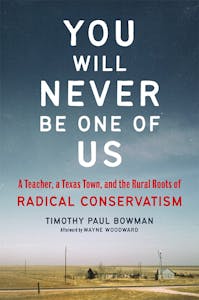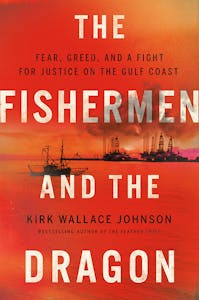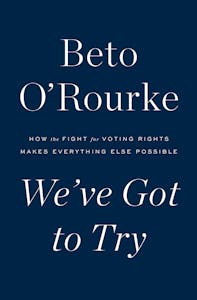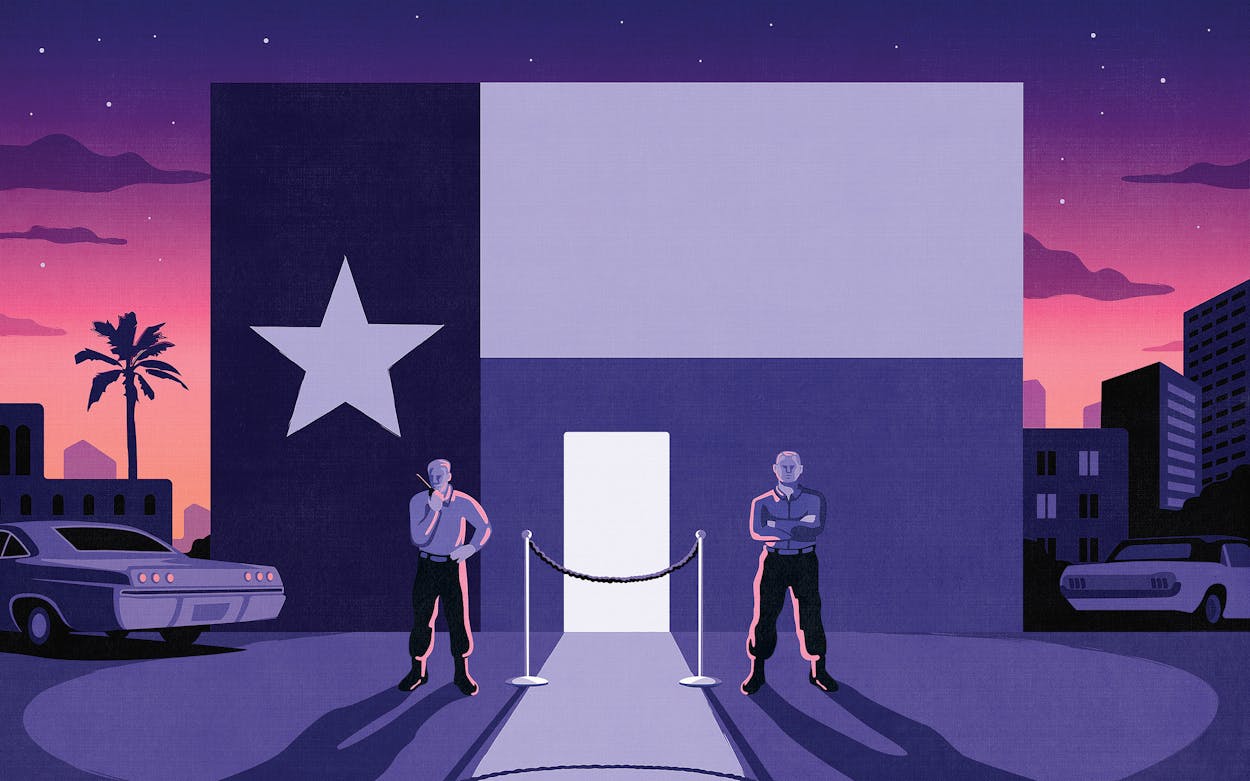Since the establishment of the Republic of Texas in 1836, there has been bitter disagreement about exactly who belongs here. Despite the crucial role Tejanos played in the Texas Revolution, after the conflict many of them were exiled to Mexico because of doubts about their loyalty. Indigenous groups likewise faced exclusion; while President Sam Houston sought peace with Native peoples, his successor, Mirabeau Lamar, pursued a brutal strategy of removal and extermination. Even after emancipation, African Americans were treated as second-class citizens—at best—during Reconstruction and the decades that followed.
Though our state has grown more inclusive in recent years, the debate over who counts as a Texan has never fully cooled and has lately erupted once again into a rolling boil. Take, for instance, the matter of immigration. In the summer of 2019 a white Texan citing a Hispanic “invasion,” echoing the language used by then-president Donald Trump, killed 23 shoppers at an El Paso Walmart. Hungarian prime minister Viktor Orbán—known for his harsh anti-immigration policies, as well as dark references to the perils of race mixing—recently received a warm welcome at the Conservative Political Action Conference in Dallas. And Governor Greg Abbott (who, along with Lieutenant Governor Dan Patrick, has amplified Trump’s invasion language) has ordered the busing of migrants apprehended at the border to the East Coast, a move widely denounced as a vicious publicity stunt.
A trio of new books explores the mechanisms by which some Texans have been excluded over the past century. Although their authors demonstrate that race and national origin are frequently the basis for expulsion, politics and culture matter too. Taken together, these volumes ask: Who gets a seat at the table, and who gets to decide?

You Will Never Be One of Us: A Teacher, a Texas Town, and the Rural Roots of Radical Conservatism (University of Oklahoma Press), by historian Timothy Bowman, probes the obscure but revealing case of Wayne Woodward. Hired in 1969 to teach English at La Plata Junior High School in Hereford (about fifty miles southwest of Amarillo), Woodward taught for six years before the school board terminated his contract. District officials claimed substandard performance and violations of protocol, but Woodward insisted that the real reason was his founding of a local chapter of the American Civil Liberties Union.
Woodward thought the ACLU would help him defend his Mexican and Mexican American students—many of whom were the children of migrant farmworkers—against the bigotry of school administrators. As one of his bosses supposedly told him: “They’re just Mexicans, they’re never gonna amount to anything. Just pass them and get them out of here.” According to Bowman, the hostility to “big government” among many in the Panhandle fueled local opposition to the ACLU, as did the organization’s long history of advocating for workers’ rights in Texas, which raised the specter of socialism for some.
An associate professor at West Texas A&M and the author of a previous book about race and labor in the Rio Grande Valley, Bowman portrays a rural Texas where many communities seem not to have changed much over the past half century. At times the book evokes the stifling insularity parodied by Sinclair Lewis in his 1920 novel Main Street. Consider the admonition of the school’s guidance counselor, who told one of Woodward’s colleagues, “Hereford’s just not a radical town. It just doesn’t need to be changed. We’re a conservative community and it shouldn’t be changed.”
This blinkered thinking prevailed: though Woodward won a lawsuit alleging wrongful termination, he never taught again and instead moved to Amarillo, where he became a nurse practitioner. In nearly fifty years, he’s been back to Hereford exactly once. For those who despair of the attitudes that can often make such places inhospitable to those who think differently from the majority, Bowman’s book is equal parts depressing and maddening.

At about the same time, but hundreds of miles to the southeast, another battle over belonging churned the waters of the Texas Gulf Coast. There, Vietnamese refugees attempting to break into the fishing business met stiff resistance from some locals. While many Anglos took pains to cast their objections in economic—and not racial—terms, their masks often slipped, as when the mayor of Seadrift told a reporter: “They’re so different . . . They’re human beings, but . . .”
In 1979, after a Vietnamese man killed a crabber who had destroyed his fishing traps (the case was later ruled self-defense), a group of white fishermen enlisted the Ku Klux Klan to drive out the Vietnamese immigrants. The Klan burned a fishing vessel it christened the U.S.S. Viet Cong and launched a “boat patrol” that cruised the waters near the town of Seabrook, carrying armed men and featuring an effigy (apparently a repurposed cigar-store Indian) strung up by a noose.
“The federal government flew ’em here!” Klan leader Louis Ray Beam Jr. said of the Vietnamese immigrants. “First class all the way! They are your replacements”—rhetoric that may be familiar to viewers of today’s Fox News, whose most popular host, Tucker Carlson, frequently invokes replacement theory, the belief that people of color threaten to supplant the nation’s white population. The Southern Poverty Law Center eventually took up the case of the Vietnamese fishermen, whose leader, Nam Văn Nguyễn, was a war hero. The SPLC helped the immigrants win an injunction in 1981, forcing their antagonists to back off and securing their foothold in the industry.
Journalist and author Kirk Wallace Johnson learned of these events when, a few years ago, he first heard Bruce Springsteen’s “Galveston Bay,” a 1995 ballad inspired by the conflict. In his scrupulously reported The Fishermen and the Dragon: Fear, Greed, and a Fight for Justice on the Gulf Coast (Viking), Johnson displays an unmistakable admiration for the Vietnamese fishermen, rooted in their grit and perseverance. But he also strives to understand the response of the established fishermen to their new neighbors. Their perspective calls to mind a much more famous Springsteen song, “Born in the U.S.A.,” which describes a working-class soldier who returns from the Vietnam War only to find economic precarity and social alienation. On the Gulf Coast, this meant declining shrimp hauls, partly the result of industrial pollution, and a lot of heavy drinking. There’s also something of a twist ending: in recent years, the two sides have found common cause in opposing the polluters, who endanger their health and livelihoods.

For Beto O’Rourke, the former congressman and current candidate for Texas governor, the definitive measure of belonging is the right to vote. In We’ve Got to Try: How the Fight for Voting Rights Makes Everything Else Possible (Flatiron Books), he argues that suffrage is under attack around the nation in general and in the Lone Star State in particular.
O’Rourke frames his short but impassioned book around the struggle of Lawrence Aaron Nixon, a Black physician in O’Rourke’s hometown of El Paso. Nixon fought a two-decade struggle against the state’s notorious white primary, which forbade African Americans and eventually Mexican Americans from participating in the primary elections, which almost invariably determined the general election winner. After two trips to the U.S. Supreme Court, he finally prevailed in 1944.
O’Rourke’s book is less a history lesson than a call to action, inspired by state efforts underway to restrict access to the vote, which he describes as the most aggressive in the nation. “At the beginning of 2021, there were more than three million eligible Texans who were not registered to vote,” he writes. “That’s not by accident, but by design. In Texas, there is no automatic voter registration, no same-day voter registration, and it’s one of only ten states that do not allow you to register online.” These policies disproportionately affect low-income and minority voters. For O’Rourke, securing the franchise is foundational, since “every other issue imaginable—from our ability to see a doctor, to the quality of our kids’ schools, to the kind of job we can get, to the expectation to be treated and judged fairly within our criminal justice system—is dependent on the right to vote.”
As one would expect from what is essentially a campaign book, O’Rourke sounds a consistently upbeat note and writes with eloquence about how to build the biggest possible tent in the Lone Star State. But his optimism is belied by the current political crisis facing the United States. For the arc of history to bend toward justice, three things usually need to happen: Someone must step forward, often at great personal cost, to start the bending, as Wayne Woodward, Nam Văn Nguyễn, and Lawrence Aaron Nixon did. Then they must persuade others to join them in the struggle. And then they must persuade a powerful governmental body to provide redress. In all three of the books reviewed, it was our judicial system, not our legislative and executive bodies, that made the difference.
It’s almost impossible to envision the current United States Supreme Court, dominated by right-wing radicals, stepping up in the same manner. The Fifth Circuit Court of Appeals, the powerful federal court that covers Texas, seems similarly reluctant to protect the most vulnerable. And without that level of intervention, it’s quite easy to imagine Texas sliding back into a past that, as these three books remind us, is not that distant at all.
Andrew R. Graybill is a professor of history and director of the William P. Clements Center for Southwest Studies at Southern Methodist University.
This article originally appeared in the October 2022 issue of Texas Monthly with the headline “Who Belongs Here?” Subscribe today.
- More About:
- Books
- Beto O'Rourke
- Houston







